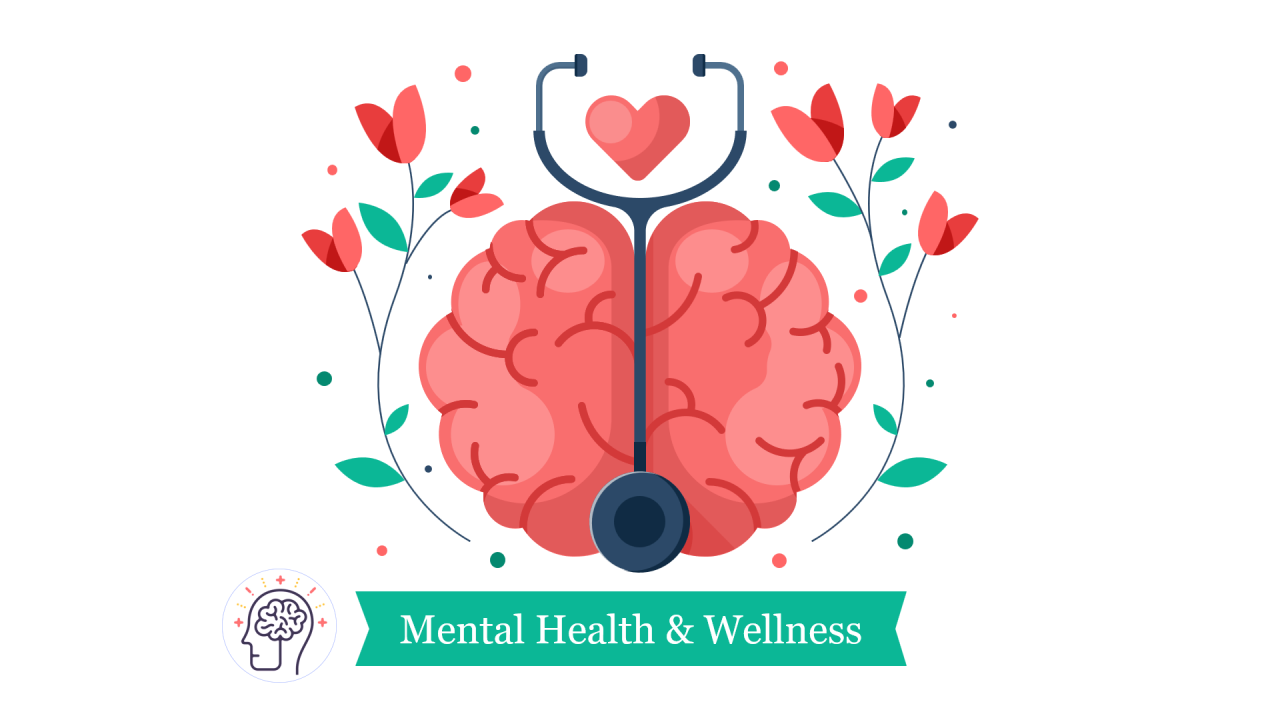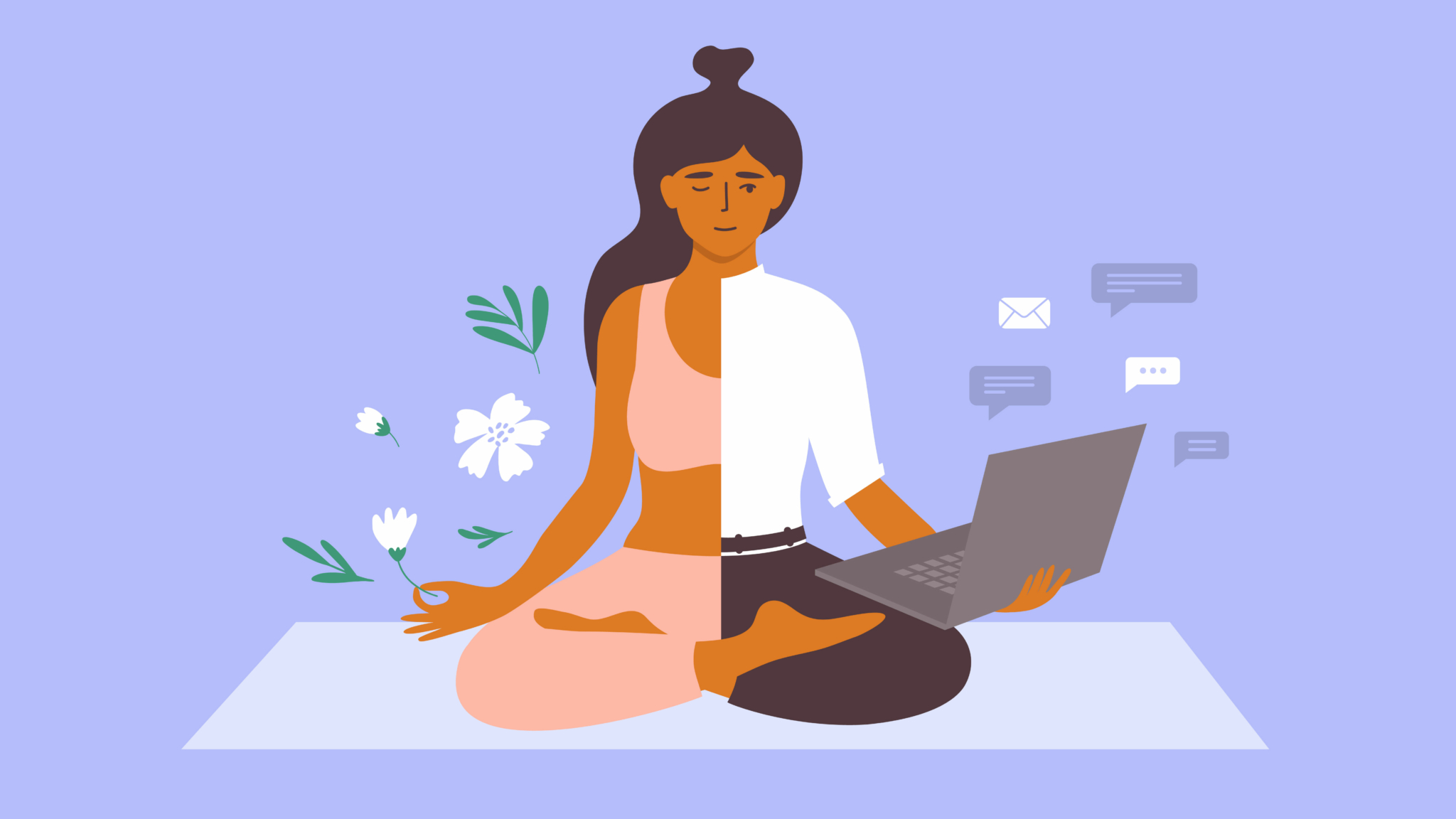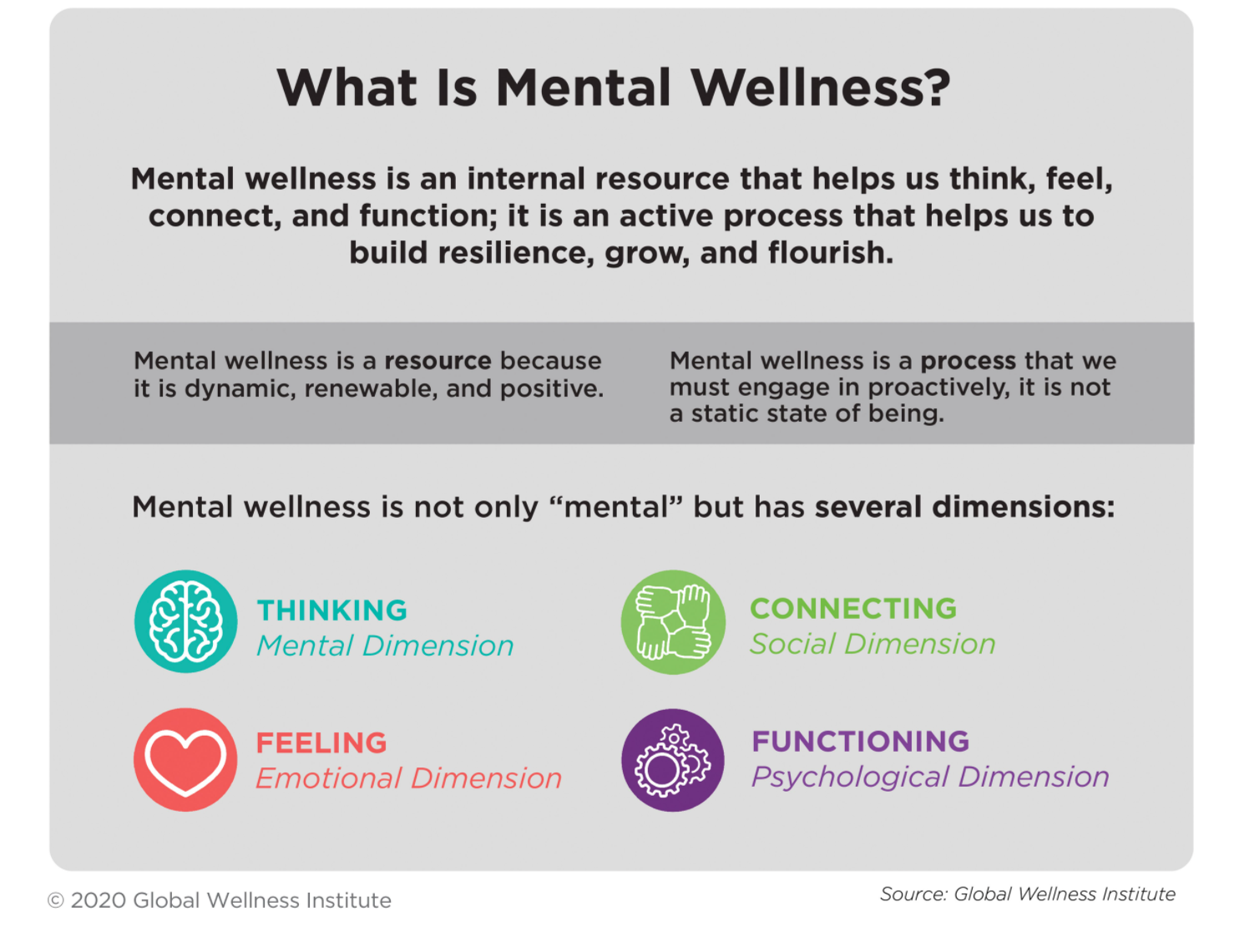Mental health is wellness, encompassing emotional, psychological, and social well-being. It affects how we think, feel, and act.
Mental health is crucial for overall wellness. It influences our daily lives, relationships, and ability to handle stress. Good mental health allows individuals to realize their potential, cope with normal life stresses, work productively, and contribute to their communities. Poor mental health can lead to issues like anxiety, depression, and decreased quality of life.
Prioritizing mental health involves practices such as regular exercise, maintaining a balanced diet, getting sufficient sleep, and seeking professional help when needed. By nurturing mental health, we enhance our overall well-being and live more fulfilling lives.

Credit: www.linkedin.com
The Connection Between Mental Health And Wellness
Mental health and wellness are deeply connected. Good mental health leads to overall wellness. Poor mental health affects daily life and physical health. Understanding this connection helps in maintaining a balanced life.
Mind-body Connection
The mind and body are linked. Stress impacts physical health. Relaxation improves mental state. Exercise boosts mood and reduces anxiety. Proper sleep enhances mental clarity. A balanced diet supports brain function.
| Activity | Impact on Mental Health |
|---|---|
| Exercise | Improves mood, reduces anxiety |
| Sleep | Enhances mental clarity |
| Balanced Diet | Supports brain function |
Emotional Well-being
Emotional well-being is key to mental health. Managing emotions reduces stress. Positive relationships boost happiness. Self-awareness helps in understanding feelings. Mindfulness practices calm the mind. Seeking help is important when needed.
- Manage emotions to reduce stress.
- Maintain positive relationships for happiness.
- Practice self-awareness to understand feelings.
- Use mindfulness to calm the mind.
- Seek help when needed.
Common Mental Health Challenges
Many face mental health challenges daily. These issues affect thoughts, feelings, and behaviors. Recognizing common challenges helps in seeking timely help.
Anxiety And Stress
Anxiety is a feeling of worry or fear. It can be mild or severe. Stress occurs when you feel overwhelmed. Both can impact daily life.
- Rapid heartbeat
- Excessive sweating
- Restlessness
- Fatigue
- Difficulty concentrating
Managing anxiety and stress involves:
- Regular exercise
- Healthy eating
- Practicing mindfulness
- Deep breathing exercises
- Seeking professional help
Depression And Mood Disorders
Depression is more than feeling sad. It affects daily activities and can lead to serious health issues. Mood disorders include depression and bipolar disorder. They cause extreme mood swings.
- Persistent sadness
- Loss of interest in activities
- Changes in appetite
- Sleeping too much or too little
- Feelings of hopelessness
Coping with depression involves:
- Talking to a therapist
- Taking prescribed medications
- Joining support groups
- Regular physical activity
- Maintaining a routine
Recognizing Mental Health Signs
Understanding mental health signs is crucial for wellness. Spotting changes early can help you or a loved one seek help. Here are key signs to watch for.
Behavioral Changes
Behavioral changes are often the first sign of mental health issues. These can include:
- Withdrawing from friends and family
- Changes in sleep patterns
- Lack of interest in activities
- Increased substance use
Such changes can indicate stress, anxiety, or depression. Pay attention to sudden shifts in behavior.
Emotional Symptoms
Emotional symptoms are another key indicator. These may manifest as:
- Persistent sadness or irritability
- Feeling overwhelmed or anxious
- Extreme mood swings
- Feelings of hopelessness or worthlessness
These emotional changes can affect daily life. Recognizing them early can lead to effective treatment.
Strategies For Improving Mental Health
Improving mental health is crucial for overall wellness. Here are some effective strategies that can help enhance your mental well-being. Incorporating mindfulness practices and regular physical activity can make a significant difference in your mental health.
Mindfulness Practices
Mindfulness practices can help calm your mind. They involve focusing on the present moment. Simple techniques like deep breathing can be very effective. Here are some practices to try:
- Deep Breathing: Take slow, deep breaths. Focus on each breath.
- Meditation: Spend a few minutes each day meditating. This helps reduce stress.
- Gratitude Journaling: Write down things you are grateful for. This improves your mood.
Physical Activity
Physical activity boosts your mood and energy levels. It also improves your physical health. Here are some activities to consider:
| Activity | Benefits |
|---|---|
| Walking | Easy and effective. Boosts mood and reduces stress. |
| Running | Increases endorphins. Improves overall mental health. |
| Yoga | Combines physical activity with mindfulness. Reduces anxiety. |
Engaging in these activities regularly can greatly benefit your mental health. Choose what works best for you and make it a habit.
The Role Of Nutrition In Mental Health
Nutrition plays a big role in mental health. What we eat affects how we feel. A good diet helps our brain work well. Bad food choices can make us feel sad or anxious. Eating the right foods can help us stay happy and healthy.
Balanced Diet
A balanced diet gives our body what it needs. It includes many types of foods. We need fruits, vegetables, grains, and proteins. Each type of food helps our brain in different ways.
Fruits and vegetables are full of vitamins. Grains give us energy. Proteins help our brain grow and stay strong. Eating a mix of these foods keeps our brain healthy.
Here is a simple table showing important food groups:
| Food Group | Examples | Benefits |
|---|---|---|
| Fruits | Apples, Bananas | Vitamins, Fiber |
| Vegetables | Carrots, Spinach | Vitamins, Minerals |
| Grains | Bread, Rice | Energy, Fiber |
| Proteins | Meat, Beans | Growth, Repair |
Nutritional Deficiencies
Nutritional deficiencies can hurt our brain. Not having enough vitamins can make us feel bad. Lack of vitamin D can lead to sadness. Missing vitamin B12 can cause memory problems.
Iron is also important. Low iron can make us tired and slow. Omega-3 fats are needed for our brain too. They help us think clearly. Eating fish or taking supplements can help.
Here are some common deficiencies and their effects:
- Vitamin D: Sadness, tiredness
- Vitamin B12: Memory loss, confusion
- Iron: Tiredness, weakness
- Omega-3 Fats: Poor thinking, mood swings
Eating a balanced diet can prevent these problems. Good food choices make us feel better. It helps our body and mind stay strong.
Building A Support System
Building a support system is vital for mental health wellness. A strong support system provides comfort, advice, and a sense of belonging. This network can include family, friends, and professionals. Each plays a unique role in supporting mental health.
Family And Friends
Family and friends are often the first line of support. They offer a listening ear and a shoulder to lean on.
- Family: They provide unconditional love and understanding.
- Friends: They help reduce stress and offer companionship.
Having open conversations with family and friends about mental health can strengthen relationships. Trust and honesty are key in these discussions.
Professional Help
Professional help is crucial for addressing mental health challenges. Mental health professionals offer expertise and guidance.
| Professional | Role |
|---|---|
| Therapists | Provide talk therapy and coping strategies. |
| Psychiatrists | Prescribe medication and manage treatment plans. |
| Counselors | Offer support and practical advice. |
Seeking professional help can feel daunting. Remember, it’s a sign of strength to ask for help. Professionals are trained to listen and provide the best care possible.
Creating A Mental Health Routine
Creating a mental health routine is key to maintaining overall wellness. By integrating daily habits and setting goals, you can achieve a balanced life. Here are some effective strategies to help you build a strong mental health routine.
Daily Habits
Daily habits play a crucial role in mental health. Simple activities can make a big difference.
- Exercise regularly: Engage in physical activities like walking, jogging, or yoga.
- Eat a balanced diet: Include fruits, vegetables, and whole grains in your meals.
- Sleep well: Aim for 7-8 hours of sleep each night.
- Practice mindfulness: Spend a few minutes meditating or practicing deep breathing.
Keeping a consistent daily routine helps stabilize your mood. This can reduce stress and anxiety.
Setting Goals
Setting goals can give you direction and purpose. Start with small, achievable goals and gradually increase their complexity.
- Identify your priorities: Focus on what truly matters to you.
- Set SMART goals: Ensure your goals are Specific, Measurable, Achievable, Relevant, and Time-bound.
- Break goals into steps: Divide your goals into manageable tasks.
- Track your progress: Use a journal or an app to monitor your achievements.
- Celebrate small wins: Acknowledge your progress and reward yourself.
Goal-setting can boost your self-confidence and provide a sense of accomplishment.

Credit: tandempsychology.com
Overcoming Mental Health Stigma
Overcoming mental health stigma is crucial for overall wellness. Stigma creates barriers to seeking help. It affects people’s lives and well-being.
Educating Yourself
Education is the first step in overcoming mental health stigma. Learn about mental health conditions. Understand their symptoms and treatments.
- Read books and articles on mental health.
- Attend workshops and seminars.
- Follow mental health experts on social media.
Being informed helps you support others better. It also helps correct misconceptions.
Spreading Awareness
Spreading awareness is key to reducing stigma. Share what you learn with others. Use your voice to educate your community.
- Discuss mental health openly with friends and family.
- Use social media to share facts and stories.
- Participate in mental health awareness campaigns.
Public awareness can make a big difference. It encourages people to seek help without fear.

Credit: www.wework.com
Frequently Asked Questions
Is Mental Health Part Of Wellness?
Yes, mental health is a crucial part of wellness. It affects overall well-being and quality of life.
What Is The Relationship Between Mental Health And Wellness?
Mental health and wellness are closely connected. Good mental health enhances overall wellness. Poor mental health can harm physical health. Fostering mental well-being boosts life quality.
Is Mental Health The Same As Wellbeing?
Mental health and wellbeing are related but not the same. Mental health focuses on emotional and psychological state, while wellbeing includes overall life satisfaction and physical health. Both are important for a balanced life.
What Is Mental Wellness?
Mental wellness is the state of well-being where individuals can cope with stress, work productively, and contribute to their community. It involves emotional, psychological, and social health. Good mental wellness helps in making sound decisions and forming healthy relationships.
Conclusion
Prioritizing mental health is crucial for overall wellness. Small steps can lead to big changes. Practice self-care and seek help if needed. Remember, mental health impacts every aspect of life. Embrace wellness to live a happier, more balanced life. Invest in your mental well-being today for a brighter tomorrow.
